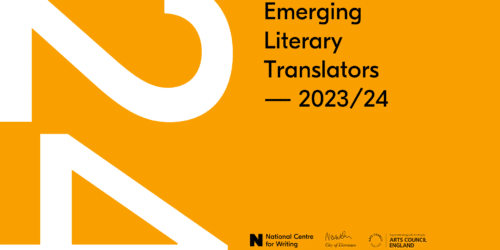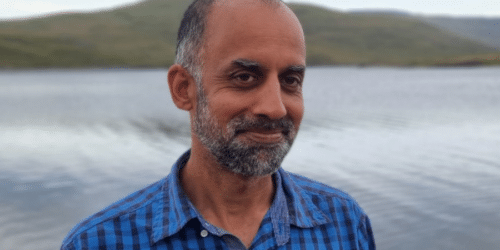Our second provocation of Worlds Literature Festival was given by Owen Sheers, poet, scriptwriter and author. What follows is a summary of Owen’s provocation, and the discussion it inspired. (I’ve endeavoured to be as accurate as possible, but you can watch or listen to the provocation below.)
Owen begins by placing his provocation on The Want of War in the context of his own work. Owen’s writing has often explored war; his verse drama Pink Mist counterpoints soldiers’ experiences in Afghanistan with the feelings of their wives, mothers and partners when the soldiers return home. His most recent play, The Two Worlds of Charlie F. was created with wounded soldiers, and won the Amnesty International Freedom of Expression Award at the Edinburgh Festival.
Owen then explores ideas of nostalgia and war through distance- the distance between home and battle ground, society and soldiers, war and peace. Most contemporary soldiers suffer nostalgic urges more on returning home then when stationed overseas. Melancholia, post traumatic stress disorder, exhaustion, shell shock, war neuroses, are just some of the terms that the military have used to try and define the psychological effects of war, and most of these conditions only become apparent when the soldier returns home.
Nostalgia is defined as a desire to be somewhere else, in another time or another place. For soldiers, this nostalgia is often perverted, so the longing becomes for combat and war. Nostalgia is inverted with post traumatic stress disorder.
Robert Harris says; “There’s a hole in modern man where war should be.”
Soldiers have a professional desire to experience combat, for if they don’t it’s like going to a fairground and not going on the rides. Added to this professional desire is the fact that the majority of British soldiers are recruited from disadvantaged areas, meaning that many join the army to escape their homes and hometowns.
For soldiers going overseas to fight, it means that they can finally put their training into action, and do the job they are being paid to do. Yet, when the soldiers start fighting they find that fighting the enemy is no longer just about ‘doing the job’. Instead the soldiers experience a compression of belonging; from belonging strongly and loyally to your country, battalion, regiment, division, brigade, commanding officers, fellow soldiers. This loyalty becomes a form of love, and then this love is transformed into a desire for revenge, when those you love and are loyal to are injured or killed.
Loss becomes the reason for fighting. You want to kill the enemy because they hurt your friends. Owen explains that for the soldiers the sense of attachment for their fellows was the strongest emotional bond they had experienced, beyond that even of family. This bond is heightened by the extreme pressures of a warzone and the constant possibility of death. Fighting gives a strong sense of identity and purpose; the soldiers’ lives may be more precarious but also more precious.
On returning home the soldiers lose these heightened qualities of life. This is what lies at the heart of the pain they experience when they return. Many young men returning home live in a world of aftermath… This is to do with what conflict provides and society does not.
The soldiers’ internal scales are tipped off balance due to their experiences of conflict. The rapid transition from warzone to home-life exacerbates this, as the speed of their physical travel is far more rapid than the psychological shift.
The second distance is harder to explain and harder to broach: it is the distance between the soldiers and the rest of society- they have experienced horrors on behalf of society, but society seems unaware of what the soldiers have experienced.
The narratives we hear of war are very one sided and manipulated by the media. We do not hear what our soldiers have done and how our soldiers have been affected by their actions in war. It’s this gulf that soldiers want to breach; they want the public to know about their experiences. It is a failure of story that the true costs and experiences of war are glossed over.
Owen follows this by saying that the best thing to cut through bland, homogenised propaganda is the well-told personal story. But how can we best capture these stories, and who should be telling them? In the past our soldiers wrote these stories (Sassoon, Owen, etc), but now these stories tend to be told by professional writers, outsourced and slightly dislocated, the primary source story modified by the lens of the writers’ distance.
Owen asks if it is not our duty as a society to work harder and give those who experience conflict the tools to write about it. He then wonders if we are guilty of a nostalgia for the easy narrative of past wars, taking comfort in the familiar and simple dialectics of World Wars, rather than tackling the more difficult situations of our present wars.
Perhaps literature can no longer realistically expect to be at the forefront of war- is this now the space for short films and YouTube etc? How can we make sure that stories of modern conflict are heard?

Discussion:
Our delegates began by discussing the lack of female voices in Owen’s provocation. Owen stated that he has very much wanted to interview women soldiers, but wasn’t able to. Instead, Owen explored the female experience in Pink Mist, telling the stories of the women left at home.
Returning soldiers may feel exiled at home, in part due to their previous urge to escape their home. This urge to join up and fight, and escape ordinary life, is a thread which runs through war narratives – Homer’s Odysseus couldn’t wait to escape home. When soldiers return home they often find they are unable to be close to their mothers and partners, instead longing for war.
War can give people emotional comfort- for soldiers they are living an intense life of risk, as well as being involved in a grand narrative of patriotism and history. But on returning home, the soldiers experience a second death, their sense of purpose removed and the society they were fighting for seeming to ignore them. It is extremely difficult for soldiers to listen to TV and the radio, and hear the war described as a waste of time and waste of life – it further ostracises the soldiers from society. There is a gap between the false narrative of war at home, and the real narrative at war.
It is necessary to listen to soldiers’ stories and get inside their wound, but there’s concern around these stories acting as propaganda for war, encouragement rather than deterrent. Already there is an industry of toys, comics, television and films which glamourises war and violence. Literature is a meaningful tool to react against the inbuilt propaganda of war.
Yet the idea of stories is to make sense of things- but how can you make sense of futile deaths and war, and how much do soldiers create revised narratives and stories of their experiences of war? Whilst Owen interviewed many soldiers to create his play, he was only able to interview them on one occasion, so wasn’t able to identify revised narratives, or discover how the soldiers’ stories had changed.
The discussion ended with a debate around authenticity in fiction – when writing about real events, and using people’s stories, how do you maintain the authenticity of the event, while moving further away from the truth? As a writer the challenge is to find the alternative imagined event that captures the authenticity of the real event
The conclusion? You need to write something which contains the truth even if it is not true.
Find out more about Worlds Literature Festival.
Find out more about Owen Sheers.
Watch Owen’s Provocation:
Listen to Owen’s Provocation:
LINK BROKEN
Worlds Literature Festival Provocation – Owen Sheers by Writers’ Centre Norwich
Reading List
Siegfried Sassoon
Wilfred Owen
Owen Sheers – Pink Mist
Kevin Powers- The Yellow Birds
Erich Maria Remarque- All Quiet On the Western Front
Richard Yates – A Good School
Ford Maddox Ford- Parade’s End
Dave Eggers- What is the What







